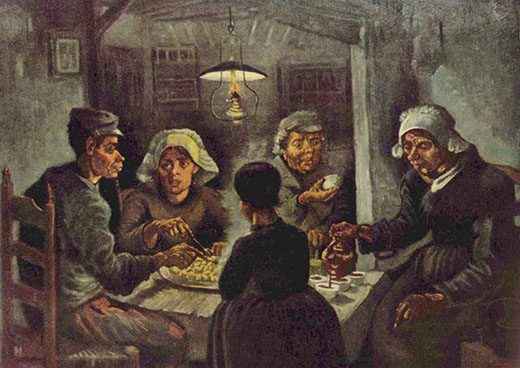Yes the world is returning to a zero growth or negative growth future very soon. Agriculturally and financially. But it won't be idylic. All the projections for the present and the near future are based on growth. Economies can't survive with zero growth. Capitalism demands growth. Right now the bailouts and stimulus programs are creating an illusion of growth. But it is winding down in a hurry. Watch Obama's speech about the economy tonight. Peacenik will. Will Obama mention growth? Will he tell the truth? Will he tell people how to survive in a zero growth world? Can one survive in a zero growth world?Posted by Ugo Bardi on September 14, 2009

Ancient peasants lived, mostly, in a "zero growth" world and, perhaps, in the future we'll return to a condition in which the finiteness of resources is an obvious fact of life. We see in this painting a group of 19th century Dutch peasants as painted by Vincent Van Gogh, who had an uncanny capability of showing not just the exterior aspect of things but also their inner reality ("The potato eaters", 1885, the Van Gogh museum, Amsterdam)
We often think that we have a problem of scarcity of resources. It is not so: scarcity is not absolute. Whether we have enough of something or not depends on our perception of what we need. And, because we seem to think that we never have enough, we tend to use what we have faster than it can be replaced. It is the phenomenon called "overexploitation" or "overshoot". It is the main problem that we are facing and it is all because of the way the human mind works. Just as beauty is in the eye of the beholder, overexploitation is all in the brain of the exploiter.
Nate Hagens has argued several times in "The Oil Drum" that the human mind is geared for growth (see, for instance here ). Apparently, we act on the basis of a series of neurotransmitters (e.g. dopamine) that make us search for continuously renewed stimulation. This way of functioning of the human mind is what generates our tendency of "discounting the future", that is of giving a lower value to the future than to the present. This rapidly declining discount function is the key of the mechanism of overexploitation.
Read on...
